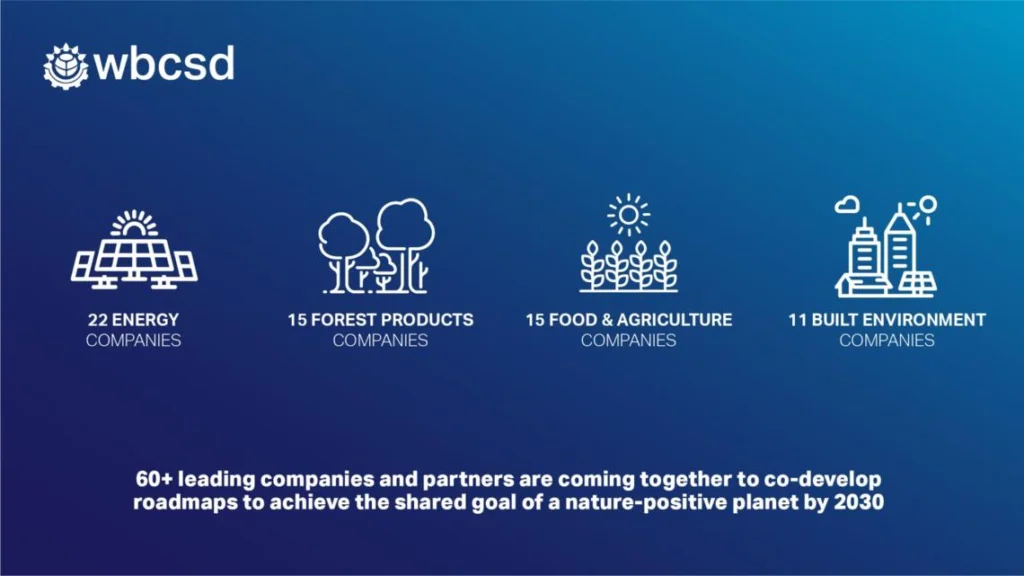Authors
Communications
Florent Menegaux, the CEO of Michelin, a WBCSD member company, sent a clear message: “If we want our future to be better, it is time to act now.”
Geneva, 12 June: Last week, 6,000 leaders from business, politics and academia, representing 43 countries, gathered at the Movin’On Summit in Montreal, to move from ambition to action in respect of sustainable mobility.
Together, participants explored the challenges, opportunities and cutting-edge solutions required to lead the way for sustainable mobility. The key themes included decarbonization and air quality; multimodal urban transit and society; innovative technologies; goods transportation and multimodality; and the circular economy.
WBCSD had a strong presence at the conference, both with an exhibit stand for SiMPlify as well as dedicated sessions related to the Transforming Urban Mobility (TUM) project and workstreams.
WBCSD’s SiMPlify methodology was presented first at the Movin’On summit, as part of the Decarbonization Toolbox initiative. The initiative gathers five key international organizations that help transport stakeholders to implement measures that contribute to limiting global warming “well below 2°C”, as noted in the Paris Agreement. The initiative supports an inclusive dialogue between countries, cities, regions, companies, citizens and experts to define low-emissions objectives and strategies.
SiMPlify helps cities develop sustainable urban mobility plans based on facts and data, to deliver safer, cleaner, more accessible and more efficient mobility to their citizens. Movin’On was an excellent opportunity to present SiMPlify’s latest success in the city of Feira de Santana, where local officials have committed USD $26 million to making a series of changes that SiMPlify helped them to identify and prioritize.
The conference drove home the reality that sustainable mobility is a crucial contributor for realizing many of the Sustainable Development Goals (SDGs), even though it is not specifically mentioned as a goal by itself. For example, air quality has a direct impact on health, and the switch away from fossil-fuelled vehicles can help to mitigate the effects of climate change. There was a “goosebumps” moment in the audience, for example, when Kristof Vereenooghe (the CEO of EVBox) explained that in New Delhi, simply breathing normally throughout the day is the equivalent of smoking 44 cigarettes.
This is not unique to Delhi, or even to India. 95% of people in cities across the world already breathe air that exceeds WHO air quality standards. By 2030, these same cities (and more) will be home to 60% of the global population. Because of this, motorized mobility will increase by 41%. It is easy to see how moving to sustainable mobility can help to improve the quality of life for people in cities, in terms of health, congestion, liveability and access.
WBCSD took the opportunity to highlight the efforts in our Emobility workstream within the TUM project, which aims to accelerate the adoption of electric vehicles and help decarbonize transport in cities. Our Emobility lead, Byeronie Epstein, led a session with members Crystal Lassiter (UPS), Igor Stamenkovic (Eaton), Aditya Ramji (Mahindra) and Mariana Bleck (EDP) focusing on electric vehicles for last mile deliveries.
The key takeaway from this session, which explored the actions that are needed to accelerate the transition to low emission vehicles, is that electric corporate fleets can significantly contribute to reversing the air quality crisis in cities. Urban freight is currently responsible for a substantial share of pollution as well as for 6% of all transport-related greenhouse gas emissions. In addition, last mile deliveries account for 25% of emissions in the logistic supply chain.
It makes sense then, that electrified corporate fleets can have a massive impact. Making the transition to electric for urban last mile deliveries can help reduce emissions in urban areas. Cities like Copacabana in Rio de Janeiro, Brazil, and Utrecht in the Netherlands have all implemented successful projects that have transitioned last mile deliveries to low emission mobility.
In addition to these efforts, the Transport Decarbonization Alliance (TDA) unveiled their achievements on urban freight. They convened a panel including WBCSD, to discuss their white paper on urban freight and call for zero emission urban freight vehicles. This collaboration between cities, countries and businesses has proved to be powerful so far, providing the impetus for a mandate to decarbonize urban freight by promoting co-creation and collaboration through a collection of best practices. The call for zero-emission vehicles has gathered 35 signatory organizations, and in just seven weeks it has consolidated a total demand for 100,000 low-emission vehicles across three segments of light to heavy vehicles.
Many participants at the conference confirmed WBCSD’s approach to sustainable mobility. In the future we will need “more mobility with less impact. For cities, trust is pertinent and the foundation of trust is competence” said Miguel Gaspar, Deputy Mayor for mobility and safety in Lisbon, Portugal.
To this end, TUM’s Sustainable Mobility Management workstream hosted a session gathering cities, transport authorities and companies together, to showcase a first-of-its-kind mobility system mapping technique for cities. Participants included the cities of Montreal (Canada), San Francisco (USA) and Shanghai (China), representatives of Korea and France, as well as members BMW, BNP Paribas, Michelin and Pirelli.
The unique mapping technique will help guide the collaboration of cities and business who want to transform urban mobility. It helps people understand the interdependencies in their city between technology, governance, infrastructure and user behavior.
Participants in the session reviewed and iterated this map, based on their collective experience within their cities and companies. Early-stage levers of change were identified, including data sharing; the potential for circularity within the automotive industry; and the need to deeply engage with policy in order to understand how to bridge the gap between the public and private sectors.
Throughout the conference, one theme resonated strongly across all the keynotes, presentations and panels. Collaboration is key in this transformation. As Henry Ford said over a hundred years ago: “If everyone is moving forward together, then success takes care of itself.“
To this end, WBCSD’s partner, Sustainable Mobility for All (SUM4ALL), organized a panel to discuss the Global Roadmap of Actions (GRA). Thomas Deloison, WBCSD Director of Mobility, took the stage alongside representatives from Alstom, BNP Paribas and Michelin, to provide a private sector perspective on the catalog of policy measures within the GRA.
As part of this process, more than 20 businesses including WBCSD members Bestmile, Bridgestone, EATON, EDP, ENEL, Mahindra, Nissan, Solvay and Volkswagen were interviewed to provide the business perspective on the GRA.
There was an energetic discussion between the participants in the room, outlining the need for policy to consider accessibility, the need for collaboration to create new business models and potential solutions for system change.
Alongside WBCSD’s panels and presentations, Movin’On also explored topics such as sustainable investment strategies, the effect of global warming on mobility, AI-driven e-commerce, building public trust for autonomous vehicles and much more.
Across the wide range of topics, it was evident that all participants share a common desire to redefine tomorrow’s multimodal mobility – to design a system that works for all types of users and that is clean, safe, accessible and efficient.
To learn more about WBCSD’s work in mobility, visit SiMPlify and Transforming Urban Mobility on our website.
Related
Content

Building nature positive into the energy transition
2 June, 2023

Accelerating business accountability, ambition and action and in support of Global Biodiversity Framework implementation
9 December, 2022

Developing a Nature-Positive Food & Agriculture Roadmap: Location, Rotation & other early Insights
2 December, 2022

